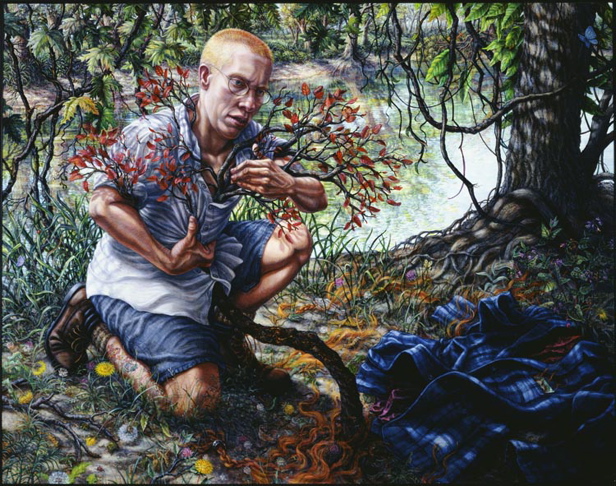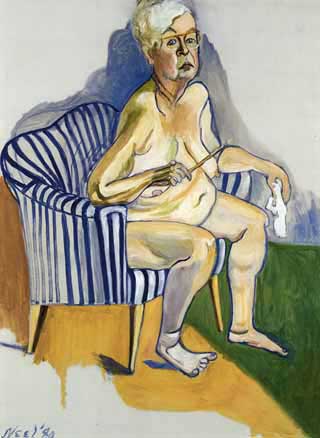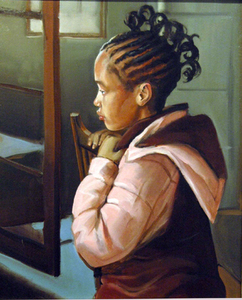May 27, 2014 - 12:10

Critical Feminist Studies: Re-engendering Ourselves, Our Institutions, Our World
English/Gender & Sexuality Studies 293, Fall 2014, Tuesday & Thursday, 2:25-3:45,
with Anne Dalke, in the English House Lecture Hall at Bryn Mawr College
Part of a 360° on Identity Matters: Being, Belonging, Becoming
 |  |  |  |
Riva Lehrer's Portrait of Eli Clare, Alice Neel's Self Portrait, Nancy Bea Miller's Amber Dreaming, and Guo Ixo's Early Spring
Not monolithic, prescriptive, conformist or singular, contemporary feminist theory covers a wide range of perspectives and approaches, which this class will showcase. The texts we will examine will focus on, but not be limited to, those that address the matters of reading and interpreting literature. Asking always about the possibilities of transformation, we will also be attending to broader theoretical and political concerns, in an attempt to define the questions which contemporary feminisms raise and the different answers with which feminisms reply.
Course Requirements:
Bi-weekly reading assignments (the 3 book-length texts—Exile and Pride, Americanah, and The Complete Persepolis--
can be purchased @ the College Bookshop, and are also available on reserve @ Canaday;
the remainder of texts are available in a password-protected file on-line).
Bi-weekly preparation for, attendance and participation in class
11 on-line reflections on our discussions/assigned readings/related topics (due by 5 p.m. on Monday)
Three 5-pp. web events
Participation in the creation and enactment of our end-of-semester "intersectional on-campus event"
For the whole cluster: a final 5-pp. paper on "intersectionality," self-evaluation and portfolio.
Syllaship ("because a bus isn't big enough")
I. Re-engendering Ourselves: Intersectionality
Week One
Day 1: Tues, 9/2 Who are we? Putting the Categories into Play
By 5 p.m. Wed, 9/3 Posting #1: Log on to Serendip, select a user name and an avatar, & use that image to introduce yourself on our course forum
Day 2: Th, 9/4 June Jordan, “Report from the Bahamas, 1982." Meridians 3, 2 (2003): 6-16.
Mary Louise Pratt, "Arts of the Contact Zone." Profession (1991): 33-40.
By 5 p.m. Mon, 9/8 Posting #2: create a webby post on Serendip, answering this question:
what name, what image, would you select to represent what you are learning
about who Eli Clare is/how he is in the world.
Log in first--then you might want to go straight to a 'visualization' of what's happened so far:
/oneworld/webby/380
Or you could look @ the webby posts 'roadmap':
/oneworld/webbylist/380
In either case, once you've read around in the posts that others have done, formulate
your contribution to the conversation that's evolving, and create a webby post:
/oneworld/node/add/webby-post?og_group_ref=380
Be sure to tag which post you're responding to, and the relation of your post to that one.
Week 2
Day 3: Tues, 9/9 Eli Clare, Part I: "Place." Exile and Pride: Disability, Queerness, and Liberation. South End Press, 1999.
Day 4: Th, 9/11: Eli Clare, Part II: "Bodies." Exile and Pride.
By 5 p.m. Mon, 9/15 Posting #3: create a webby post, reflecting back on this week's discussion of Eli Clare's memoir, applying what you have learned to the current conversation on campus about the admission of trans women. Think about the role that environment plays in creation of the self: What might be the effect, on transwomen, of being welcomed by BMC? What is the effect, on transmen, of being welcomed here? (Feel free to flip the question--what might be the effect on the campus of a larger population of transfolk?) That is, make local the questions we've been exploring in class: What happens when you start identity work with place? What role does environment play in the construction of identity?
Week 3: Riva's Lehrer's first visit to campus
Day 5: Tues, 9/16 We will be working under Riva's guide on a project called
"Ghost Parade," about our childhood bodies, and who we thought we were, growing up.
Day 6: Thurs, 9/18 Michael Bérubé. "Epilogue." Life As We Know It: A Father, A Family and an Exceptional Child. New York : Vintage Books, 1998, 1996. 250-264.
G. Thomas Couser. "Auto/Biographical, Biomedical, and Ethnographic Ethics." Vulnerable Subjects: Ethics and Life Writing. Ithaca : Cornell University Press, 2004. 14-33.
Kristin will join us; Riva will facilitate a conversation about the ethics of portraiture and informed consent.
Noon-4 p.m., Fri, 9/19: Visit to Camphill Village, to get oriented (with intent to return in time for demonstration and all inaugural events)
By 5 p.m. Mon, 9/22 Posting #4: a comment reflecting on your experiences @ Camphill.
Week 4: Meet with Anne to discuss your upcoming web-event.
Day 7: Tues, 9/23 Andrew Solomon. “Transgender.” Far From the Tree: Parents, Children, and the Search for Identity. New York: Scribner, 2012. 599-676.
Day 8: Thurs, 9/25 Judith Halberstam, “Queer Temporality and Postmodern Geographies.” In a Queer Time and Place: Transgender Bodies, Subcultural Lives. New York University Press, 2005. 1-21.
Anne Dalke and Clare Mullaney (BMC ’12). On Being Transminded: Disabling Achievement, Enabling Exchange. Disability Studies Quarterly. 34, 2 (2014).
By midnight Sun, 9/28: first 5-pp. web "event" due, analyzing a form of intersectionality (in a text? at Bryn Mawr? where else?)
[NOTE THAT YOU HAVE NO MONDAY NIGHT POSTING DUE THIS WEEK]
II. Re-engendering Our Institutions: Transitional Spaces
Week 5
Day 9: Tues, 9/30 Helen Horowitz, “A Certain Style of ‘Quaker Lady’ Dress” and “Behold They Are Women!” Alma Mater: Design and Experience in the Women’s Colleges From their Nineteenth-Century Beginnings to the 1930s. Knopf, 1984. 105-133.
Florence Goff and Karen Tidmarsh. Examining Our History: Inclusion/Exclusion at Bryn Mawr. Making Sense of Diversity: A Series of Conversations. November 18, 2005.
Day 10: Thurs, 10/2 Minnie Bruce Pratt. “Identity: Skin, Blood, Heart.” Yours in Struggle: Three Feminist Perspectives on Anti-Semitism and Racism. Ed. Elly Bulkin, Minnie Bruce Pratt, and Barbara Smith. New York: Long Haul Press, 1984. 11-63.
Alex Juhasz. About, Safe Space, These are the Rules and Regulations, and One Feminist Online Media Mantrafesto. Feminist Online Spaces: Building and LInking Principled Sites in Collaboration.
By 5 p.m. Mon, 10/6: Posting #5: a "mantrafesto" of your vision of collaborative work:
how to bring together folks who see the world differently?
How to build inclusive community (@ Bryn Mawr, for starters)?
What are its edges? Where is it bounded? How to get beyond?
(Do you want/think we should try to "get beyond"?
Week 6
Day 11: T, 10/7 Patricia Williams. The Emperor's New Clothes. Chapter One. Seeing a Colorblind Future: The Paradox of Race. 1997 BBC Reight Lectures. New York: Farrar, Straus and Girous, 1998.
Riki Wilchins. "Race Critical Thought and Postmodernism's 'Second Wave.'" Queer Theory, Gender Theory: An Instant Primer. Los Angeles: Alyson Publications, 2004. 107-121.
Keguro Macharia. On Quitting. The New Inquiry. May 3, 2013.
Sabrina Alli. Carceral Educations. The New Inquiry. September 22, 2014.
4:30-6 p.m T, 10/7, Carpenter 21: Created Equal Event: Ruth Wilson Gilmore speaking about Slavery by Another Name
Day 12: Th, 10/9
1-3:30 on the first floor of Canaday: writing workshop with Chika Unigwe, author of On Black Sisters Street
10/10-10/19 FALL BREAK: read Americanah
Riva Lehrer's second visit
By 4 p.m. Sun, Oct. 12: Posting #6: a webby post following up on our classroom conversation
about how we talk w/ and listen to one another (see ndifrank, Sunshine, Kristin, smalina)
4 p.m. Sun, 10/12-4 p.m. Thurs, 10/16: CLASS TRIP TO CAMPHILL VILLAGE,
where we will be working, during the day, on projects of representation
(remembering Riva's description: "portraiture is now about the formation of a relationship")
and staying, @ night, nearby @ Camp Sankanac
By 5 p.m. Mon, 10/20: Posting #7: a webby post of your initial reactions to Adichie's novel:
What interests (grabs/puzzles/troubles) you? What would you like us to talk about?
Week 7
Day 13: T, 10/21 Chimamanda Ngozi Adichie, Chapters 1-10. Americanah (New York: Knopf, 2013). pp. 1-115.
Chimamanda Ngozi Adichie. "We should all be feminists." TEDxEuston, April 29, 2013.
Beyonce (sampling Adichie), Flawless; Niki Minaj (sampling Beyonce), Remix.
2:30-4, Wed, Oct. 22, in Chase Auditorium @ HC: Anne Balay,
"Steel Closets: Voices of Gay, Lesbian, and Transgender Steelworkers"
Day 14: Th, 10/23 Americanah, Chapters 11-23 (to p. 237).
7:30 p.m. Fri, 10/24, in Goodhart Music Room: Monsoon Bissell and Benaifer Bhadha, "Two Woman Talking.”
10 a.m.-5 p.m. Sat, 10/25, in Dalton 1 and 2 (basement of building): Workshop with Monsoon and Benaifer on their method of "listening and talking"
By 5 p.m. Mon, 10/27: Posting #8: a proposal for the venture into "listening and talking" that you will conduct at Bryn Mawr, and report back on by 11/9.
What constructive role might Monsoon and Benaifer's method play at Bryn Mawr?
Who (do you think) needs to practice listening and talking to-and-with one another?
How can-and-will you follow-up/put this practice into action on our campus?
Week 8
Day 15: T, 10/28: discussing our proposals
Americanah, Chapters 24-38, to p. 348
Day 16: Th, 10/30 Americanah to end (p. 477)
By 5 p.m. Mon, 11/1 Posting #9: the questions raised for you by Mohanty, Nnaemeka, or
Cook-Sather and her co-writers: where would you like to focus our discussion on Tuesday?
III. Re-engendering Our World: Seeking Solidarity
Week 9
Day 17: T, 11/4 Obioma Nnaemeka. Nego-feminism: Theorising, Practicing, and Pruning Africa's way. Signs 29, 2 (Winter 2004): 357-385.
Alison Cook-Sather, Roselyn Appenteng, Huipu Li, Vrinda Varia, and Yiran Zhang. Lessons from international Students on Campus Living
and Classroom Learning. POD Conference. Pittsburgh, PA. November 9, 2013.
Day 18: Th, 11/6 Tamar Lewin. "'Sisters' Colleges See a Bounty in the Middle East." Global Classrooms. The New York Times. June 3, 2008.
Chandra Mohanty. Under Western Eyes Revisited: Feminist Solidarity through Anticapitalist Struggles. Signs 28, 2 (2002): 499-535.
By 5 p.m. Mon, 11/8 Posting #10: webby post of your initial reactions to Satrapi's novel:
What interests (grabs/puzzles/troubles) you? What would you like us to talk about?
Week 10
Day 19: T, 11/11 Marjane Satrapi. Persepolis: The Story of a Childhood. New York: Pantheon, 2003.
Day 20: Th 11/13 Afsaneh Najmabadi. "Truth of Sex." iranian.com. January 12, 2005.
Marjane Satrapi. Persepolis 2: The Story of a Return. New York: Pantheon, 2005.
Class meets without Anne (who will be attending “Feminist Transgressions,” the National Women's Studies Conference
in San Juan, Puerto Rico, presenting with colleagues about her work “Seeking Justice Inside and Outside the Walls” (on teaching in prison)
Fri, Nov. 14-Sun, Nov. 16--students travel individually, by train, to view the portraits
@ The Barnes Foundation, 2025 Benjamin Franklin Pkwy, Philadelphia, PA 19130--or
the Paul Strand exhibit @ the Philadelphia Museum of Art
By 5 p.m. Sun, 11/16: second 5-pp. web "event" due, reporting in on
the "storytelling and listening event" you have hosted at Bryn Mawr.
Who/what/when/where/how did it happen? What did you learn from the happening?
What seem to you possible next steps in this process? This web event,
like the listening event itself, can (should?) be co-created. [no Monday post due this week]
Week 11: Riva Lehrer's Third Visit
Day 21: T, 11/18 Working on self portraits with Riva
Day 22: Th 11/20: class cancelled, in order that you may attend Riva's public talk:
4:30 p.m., Th 11/20: Riva Lehrer, "The Ethics of Portraiture." Humanities Center Seminar Room, Stokes Hall, Haverford
12-4 p.m. Fri, 11/21: Visit to the Mütter Museum
By 5 p.m. Mon, 11/24: postings #11 & #12--planning for the future.
[It would be very helpful if you could make both of these postings
"webby," so I could better see the relationships among them...thanks!]
#11) What would you like to read for the three classes following Thanksgiving?
What do you think you/we need to be learning about during this time...? We could return
to an assigned text that we didn't finish discussing--Perspolis--or one never got around to discussing--
Williams on The Emperor's New Clothes, Nnaemeka on Nego-feminism--or a new text that might help you
prepare for your next webevent, such as Marilyn Waring's Counting for Nothing, or the video about her work,
Who's Counting?. Or Peggy McIntosh's "Interactive Phases of Curricular Re-Vision: A Feminist Perspective."
#12) proposal for what our on-campus intersectional event might entail (including what your role might be).
What have we learned that would be most useful to share with others on campus?
How best to showcase and share our work? What form should this sharing take:
a gallery, talks, a workshop, some combination of the above? Who will take on which tasks?
To get something of a sense of what this project might entail,
see the invitation to the story slam sponsored by the Ecoliteracy 360° last April,
and to the interactive installation we hosted in May, as well as to the workshop
on race and privilege (which included presentations of some of the work we did)
sponsored two years ago by the Women in Walled Communities 360°.
Week 12
Day 23: T 11/25: Please review all these postings, along with the instructions for Checklist and Final Portfolio,
and come to class with any questions you have about end-of-semester preparations. We'll review all expectations,
before deciding on our final readings, and beginning to brainstorm for our final on-campus "intersectional" event.
Thurs, 11/27: Thanksgiving
By 5 p.m. Mon, 12/1: posting #13--your reactions to and questions about Nnaemeka's essay. How does it invite you to think differently about internationalizing feminism (particularly in relation to Mohanty's essay, Americanah and/or Persepolis)?
Week 13
Day 24: T, 12/2 Obioma Nnaemeka. Nego-feminism: Theorising, Practicing, and Pruning Africa's way. Signs 29, 2 (Winter 2004): 357-385.
[Another good essay on African feminism: Agnes Atia Apusigah, Tullum: A Gendered African Wisdom with Possibilities for Development. Presented at 2006 CODESRIA Annual Campus on IKS.]
By 5 p.m. Wed, 12/3: if you did not post Monday night, post your reactions to and questions about Gökarıksel
and Secor's essay. How does it invite you to think differently about internationalizing feminism?
Day 25: Th, 12/4 Banu Gökarıksel and Anna Secor. The Veil, Desire, and the Gaze: Turning the Inside Out. Signs, 40, 1 (Autumn 2014): 177-200.
[For more on veiling: the Bryn Mawr performance of The Hijabi Monologues--and script.]
By 5 p.m. Sun, 12/7: Posting (tagged #lasthurrah): your contribution to the 'zine.
By 5 p.m. Mon, 12/8: posting #14--your reactions to and questions about Waring's work. How does it invite you to think differently about internationalizing feminism?
Week 14
Day 26: T, 12/9 Marilyn Waring. "Preface by Gloria Steinem," "Introduction to the Second Edition," "If Counting was the Limit of Intelligence,""Epilogue." Counting for Nothing: What Men Value and What Women are Worth. Second Edition. Toronto: University of Toronto Press, 2004. xi-li, 224-241, 256-264. If you'd prefer to access Waring's work in video form, watch Who's Counting?
4 p.m. Tues, 12/9: set up our portrait gallery in campus center; assemble, fold, staple 'zines
By 5 p.m. Wed, 12/10: if you did not post Monday night, post your reactions to and questions about Waring's work.
How does it invite you to think differently about internationalizing feminism?
Day 27: Th, 12/11 continue discussion of Waring's ideas; decompression; final evals
Noon-2 p.m., Fri, 12/12 in Rhoads Dining Hall: Our Intersectional On-Campus Event, w/ food
By midnight on Sun, 12/14, four more postings are due for the full cluster: photographs of 1) your self portrait, 2) your portrait of your villager, along with three sentences describing the person you were working with (use a first name only), and 3) your villager's drawing. For the fourth posting, write one page about what happened for you @ Camphill: not a summary of what happened, but a description of one important (vivid, definitive, symbolic?) experience that really out stood to you during our time there, a story that speaks to the nature of what you experienced. If you are still "short" on the postings you owe for the semester, you are invited to make additional postings reflecting on our intersectional on-campus event and/or our on-campus visit with the villagers.
10-1 p.m. Mon, 12/15: On-campus visit from Camphill Villagers
By 5 p.m. on Mon, 12/15: posting #15, a final reflection on some dimension of international feminism: what have you learned in this last section of the course? What would you like to explore further? If you had to write a paper on this topic, what would you have written about?
By midnight on Tues, 12/16, complete your checklist and review your portfolio materials, in preparation for meeting with all 3 profs, on Wed. or Thurs. afternoon, to discuss your semester's work, final project, and self-evaluation.
By 12:30 p.m., Fri, Dec. 19: All Work due, including a final 5-pp. paper for all classes in the cluster about intersectionality,* and your self-evaluation (see portfolio instructions for details).
*As a final reflection on and material representation of the intersecting themes of our 360°, we’d like you to post-and-tag for all three courses a 5-page essay/web event/project that addresses the theme of intersectionality. This could take a number of forms: a close reading of a novel, essay, memoir, or of one or more portraits or other works of art; an ethnographic account of intersections observed during one of our class trips (to Camphill, PMA, Barnes, or the Mütter); an exploration of one or more theoretical approaches to intersectional identity. Feel free to draw on a range of concepts from the reading for all of the three courses (for example: vertical and horizontal identities, contact zones, the ethics of representation, the role of economics, environment, or others in the construction of self…).
Notes to self for next time!
add Bernice Johnson Reagon, "Coalition Politics: Turning the Century," (presentation at the West Coast Women’s Music Festival 1981), repr. @ "She Who Stumbles...May Not Fall," https://shewhostumbles.wordpress.com/2008/01/12/bernice-johnson-reagon-coalition-politics-turning-the-century/
add also Sara Ahmed, both her "feminist killjoy" site:
http://feministkilljoys.com/2014/07/21/feminist-hurtfeminism-hurts/
and her "killjoy manifesto":
http://sfonline.barnard.edu/polyphonic/print_ahmed.htm
also check out The Promise of Happiness (2010), Willful Subjects (2014) and Living a Feminist Life (forthcoming)...
Additional Resources
Amophrast. Women's Colleges That Exclude Women, Feminist Colleges, Queer Colleges. Serendip. January 29, 2012
Ansell, Sara. Coeducation at Haverford: A Forced Revolution. Knowing the Body: Interdisciplinary Perspectives on Sex and Gender (December, 2004).
Asimov, Nanette . New Policy Clarifies "Female" for Mills College Admission. SFGate. August 21, 2014.
aybala50. The Inside: History of Women at Bryn Mawr College. Serendip. February 3, 2012.
Binkowski, Emmett, archivist. History of Gender Expression and Identity at Bryn Mawr College.
Brymer, Laura MinSun. "Better Dead than Co-Ed?" Transgender Students at an All-Women's College.
William and Mary Journal of Women and the Law 18 (2011): 135-159 (see esp. IV. Defining Sex for an All-Women's College).
Durante, Cat. Challenging the Existence of Women's College Through Transgender. May 2009.
Feldman, Kiera. Who Are Women’s Colleges For? New York Times. May 24, 2014.
Kraschel, Katherine. “Trans-cending Space in Women’s Only Spaces: Title IX Cannot be the Basis for Exclusion.” Harvard Journal of Law & Gender 35 (2012).
Lhamon, Catherine. Assistant Secretary for Civil Rights. United States Department of Education.
“Questions and Answers on Title IX and Sexual Violence":Title IX Implications of Trans-Inclusion in Women's Colleges.
Quart, Alissa. When Girls Will Be Boys. New York Times Magazine. March 16, 2008.
Title IX Implications of Trans-Inclusion in Women's Colleges. Tumblr.
